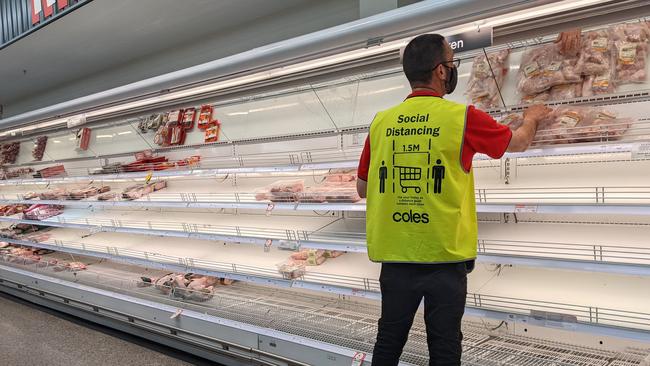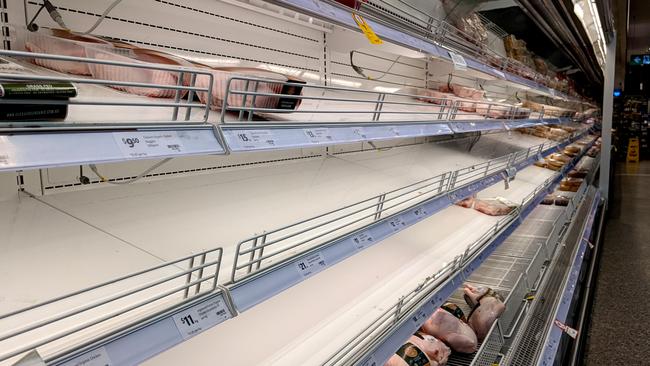Queensland’s major industries hit breaking point, supply chain under threat
Queensland’s major industries are hanging on by a thread, with staff shortages reaching such urgent levels it could temporarily shut down the state’s basic supply chain and see electricity shut down “for weeks”. SEE THE CRITICAL SHORTAGES
QLD Coronavirus News
Don't miss out on the headlines from QLD Coronavirus News. Followed categories will be added to My News.
POWER could be out for weeks, meat supplies scarce for months and supermarket shelves will remain empty as the state’s major industries face potentially disastrous staff shortages with no Rapid Antigen Tests in sight.
Queensland industry union leaders say the state’s meat supply, transport and power systems are currently hanging on by a thread and unless they can be supplied with millions of Rapid Antigen Tests, they face critical staff shortages which could temporarily shut down Queensland's basic supply chain.
For months unions have been begging for urgent supplies of RATs to help essential workers including truck drivers, meat packers and power station operators, get back to work safely.

But with the federal government denying free tests and essential workers constantly rotating in isolation, industries have been forced to take extreme staffing measures in order to keep up with supply demand.
The state’s energy sector is now stretched so thin, there are concerns over possible power outages, should a major event occur that requires more workers.
Queensland Electrical Trades Union Secretary Peter Ong said the industry is at a “crisis point” and if disaster strikes, parts of the state could be without power “for weeks”.
“If we lost one third of our workforce, it would be a real problem for the state,” he said.
“The reality is we could hit a perfect storm in Queensland where we don't have enough power station operators, not enough maintenance workers for utilities and then we get something like a cyclone in North Queensland, then we'd be in a whole s***load of pain and Queensland would be at half pace [power] generation and you’d have blackouts across the state.
“Instead of having electricity back up and running in 3-4 days it could be out for weeks.”
In an attempt to ensure the industry maintains enough of its workforce throughout the Omicron wave, electrical staff have been separated and told to work from home whenever possible.
But Mr Ong said his fingers and toes will still be crossed until the worker shortage ends.
“Our main concern is if we don’t separate teams of operators in power stations, then we possibly end up in a position where we don’t have enough operators to maintain the supply.”
“Same without crew and maintenance workers who maintain the poles and wires, all the electrical infrastructure.
“People don't realise just how essential power workers are until you end up in a situation like this where you can’t watch your telly, your Netflix or jump on your computer.
“Our blokes are under the pump and battling to maintain the system, but they’ll put their shoulder to the wheel and hopefully we don’t lose the numbers we require to keep operating.”

Workers in the meat industry are also being pushed to the max, working around the clock to ensure Aussies have food on their tables.
Matt Journeaux, Federal Secretary for the Australian Meat Industry Employees Union said staff and product supply have been “enormously” affected and if a major processing plant was to halt operations, Australia’s meat supply would “go down for months”.
“It is an emergency, it’s time to break glass,” he said.
“It wouldn't take a lot of plants to shut down for the whole country to become affected, for instance, the Dinmore Meatworks at Ipswich, that’s the largest meat processing facility in southern hemisphere.
“It usually employees 2,000 people and processes 3,400 head of cattle per day but is now down to a single shift, so if that plant was to close, you can imagine that kind of product coming out of the market, it would be absolutely devastating.
“You could see meat supply down for up to two months if that happened.”
Ingham, Australia’s largest poultry processor at 1 million birds per week, currently has one third of its employees in isolation.
Beef City at Toowoomba started 2022 with “full crews” but is now at least 100 employees short.
Mr Journeaux said if staff shortages become worse, domestic meat supply will fall dramatically and the federal government would need to redirect Australia’s export stock in order to feed the nation.
“The string has been stretched so far it’s just about ready to snap,” he said.
“There may be some need for government intervention where the red meat exports have to be channelled back onto the domestic market, before anything is put into a box and sent overseas. We would have to feed the nation instead of make profit.
“All the people that are available are working exceptionally long days, but unfortunately that’s wearing them down and making them susceptible to the virus so Covid is probably going to spread more effectively when it does get back into the [processing] plants.
“But at the moment, I believe we will still be able to get food on the table, it may not be your cordon bleu’s but you will get the chicken thighs, legs and breasts, so please don't rag on the workers, they’re doing absolutely everything they can.”

Similarly to the meatworks industry, Queensland’s fruit and vegetable producers are feeling the distribution burn.
Richard Shannon, policy and advocacy manager for Growcom said although the industry is facing about a 10 per cent reduction in staff, growers have been able to harvest enough fruit and vegetables to feed the state, they just can’t get them delivered to the shelves.
If supply chain problems persist, growers will have to decide whether to cut down their harvests or stop harvesting altogether.
“Growers are having their forward orders cancelled or cut significantly due to the supply chain being unable to accommodate the volume of supply they’re producing,” said Mr Shannon.
“It’s unfortunate that there's not enough people to drive, transport, or distribute because it’s us that end up wearing the price of that.
“Growers would have to make a decision on whether or not it's worth them harvesting in the first place and the rest would be ploughed back into the ground.”
He said if too many farmers become infected with the virus, the industry could still reach “a tipping point” leading to a shortage of fresh produce.
“There is still absolutely that prospect, that chance,” he said.

Meanwhile, Queensland’s transport sector has been noticeably under the pump, with empty Coles and Woolworths shelves showing just how sparse distribution and freight workers are.
Queensland Transport Union political co-ordinator Joshua Millroy said although the state is not facing a major supply issue yet, the transport shortage is rife.
“It may be a supply issue in the future as agriculture workers go down but at the moment it’s a transport issue,” he said.
“They have the stock but they can't get them from the distribution centres to the supermarkets.
“For example Linfox has a Woolworths contract and they drive into the Woolies yard, they're waiting there for hours and they’re leaving with half-full trucks.
“And every indication from companies is that it will get worse before it gets better.”
A source has told the Courier-Mail Woolworths and Coles are reporting around 40-50 per cent staff absentees.
Mr Millroy said modelling isn’t available to show exactly when staff shortages would hit such a critical level, that stores would start emptying altogether.
“I don’t know the exact time in which they expect that it will get worse, I think they are trying to mitigate it at the moment,” he said.
“But when you've only got so many workers available to process and pack trucks, obviously supermarkets will receive less and less, so it’s likely that if it (staff shortages) continues climbing, supply levels will get much worse.”
He said it’s possible the Army would be called in to assist with distribution as a last resort measure.
“If the Army comes in, that will be within 6-8 weeks,” he said.
“But then you still have the same issue where eventually, they will get Covid too.”
Queensland recorded another 19,932 new Covid cases on Wednesday, including 5,940 positive Rapid Antigen Tests.




